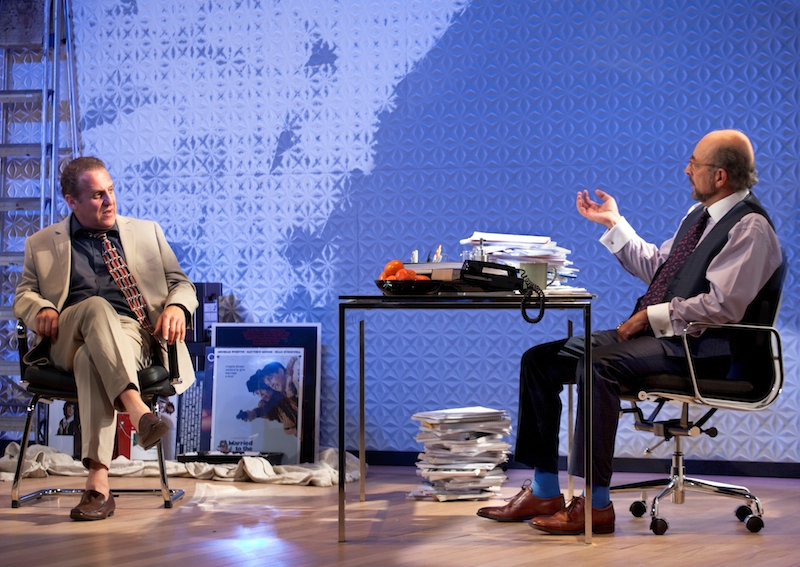Speed-the-Plow, Playhouse Theatre | reviews, news & interviews
Speed-the-Plow, Playhouse Theatre
Speed-the-Plow, Playhouse Theatre
Mamet revival and its star Lindsay Lohan escape disaster, but fail to deliver a triumph

To do Mamet’s work justice, you must be able to deliver dialogue with the speed, skill and breathtaking bravura confidence of Usain Bolt. In Lindsay Posner’s much-hyped but frustratingly sluggish revival at the Playhouse Theatre, only one of three cast members rises to that challenge – and it’s the one who’s generated by far the fewest column inches.
 Yet, Mamet’s 1988 skewering of Hollywood greed, ambition and cynical reciprocity still has thematic urgency, the targets of his wrath largely unchanged. Newly appointed executive Bobby Gould (Richard Schiff, pictured right with Lindsay) explains his role as developing either “remakes of films that haven’t been made yet” or a pale imitation of “the thing that everyone saw last year”, and the marvellously eloquent insincerity that flows between him and down-on-his-luck producer Charlie Fox (Lindsay), bringing Bobby a guaranteed smash in exchange for a redemptive credit, is a parodic masterpiece.
Yet, Mamet’s 1988 skewering of Hollywood greed, ambition and cynical reciprocity still has thematic urgency, the targets of his wrath largely unchanged. Newly appointed executive Bobby Gould (Richard Schiff, pictured right with Lindsay) explains his role as developing either “remakes of films that haven’t been made yet” or a pale imitation of “the thing that everyone saw last year”, and the marvellously eloquent insincerity that flows between him and down-on-his-luck producer Charlie Fox (Lindsay), bringing Bobby a guaranteed smash in exchange for a redemptive credit, is a parodic masterpiece.
Their mutually beneficial opportunism is disrupted by temp secretary Karen (Lindsay Lohan, pictured below), who convinces Bobby to abandon his sure thing in favour of adapting a worthy, apocalyptic tome by “an Eastern sissy writer”. This hasty Damascene conversion is notoriously difficult to deliver; here, it’s achieved by Schiff never really convincing as a studio shark in the first place, so it’s less a transformation than the welcome removal of an ill-fitting hat. He’s far more comfortable delivering quavering desolation as disillusioned Bobby laments that his rise to the top, for which he sacrificed his morality, has simply made him a bigger target.
 Lindsay offers a rivetingly humane take on the personification of capitalist temptation – not the psychopathic Mephistopheles of Matthew Warchus’s unmatched 2008 Old Vic version, but a clammy used-car salesman desperate to land a deal. It’s a resonant interpretation for this post-recession age and allows him to explore a wide range of emotions, from oleaginous glee and brutish fury to stricken incomprehension. Schiff, no stranger to lightening-speed speech after his years on Sorkin’s West Wing, succeeds in finding Mamet’s rhythm, but coasts along it rather than punching it; that the climactic conflict lands is tribute to Lindsay’s ability to generate the requisite power without full support from his sparring partner.
Lindsay offers a rivetingly humane take on the personification of capitalist temptation – not the psychopathic Mephistopheles of Matthew Warchus’s unmatched 2008 Old Vic version, but a clammy used-car salesman desperate to land a deal. It’s a resonant interpretation for this post-recession age and allows him to explore a wide range of emotions, from oleaginous glee and brutish fury to stricken incomprehension. Schiff, no stranger to lightening-speed speech after his years on Sorkin’s West Wing, succeeds in finding Mamet’s rhythm, but coasts along it rather than punching it; that the climactic conflict lands is tribute to Lindsay’s ability to generate the requisite power without full support from his sparring partner.
Schiff pays it forward by, in turn, propping up husky-voiced, endearingly childlike Lohan with a series of deft comic reactions that vastly flatter the recipient. The tabloid target is not the eye-watering car crash many predicted, calling on the prompt book just once, but is capable only of surviving the play, not bringing much of anything to it. Between lines – delivered with unvaried intonation that makes a nonsense of the stop/start punctuation – she simply switches off like a computer conserving energy, with no indication of spontaneous, collaborative live performance. She succeeds in escaping “Lindsay Lohan” but fails to create Karen, resulting in an immaculately styled void.
In the best productions, Speed-the-Plow is an excoriating attack that wields words like deadly weapons, breakneck menace competing with pitch-black barbs. Posner’s subdued rendition is perfectly serviceable, but not so much great art as – to quote Mamet – “a commodity”.
- Speed-the-Plow is at Playhouse Theatre until 29 November
rating
Share this article
Add comment
The future of Arts Journalism
You can stop theartsdesk.com closing!
We urgently need financing to survive. Our fundraising drive has thus far raised £49,000 but we need to reach £100,000 or we will be forced to close. Please contribute here: https://gofund.me/c3f6033d
And if you can forward this information to anyone who might assist, we’d be grateful.

Subscribe to theartsdesk.com
Thank you for continuing to read our work on theartsdesk.com. For unlimited access to every article in its entirety, including our archive of more than 15,000 pieces, we're asking for £5 per month or £40 per year. We feel it's a very good deal, and hope you do too.
To take a subscription now simply click here.
And if you're looking for that extra gift for a friend or family member, why not treat them to a theartsdesk.com gift subscription?
more Theatre
 Ragdoll, Jermyn Street Theatre review - compelling and emotionally truthful
Katherine Moar returns with a Patty Hearst-inspired follow up to her debut hit 'Farm Hall'
Ragdoll, Jermyn Street Theatre review - compelling and emotionally truthful
Katherine Moar returns with a Patty Hearst-inspired follow up to her debut hit 'Farm Hall'
 Troilus and Cressida, Globe Theatre review - a 'problem play' with added problems
Raucous and carnivalesque, but also ugly and incomprehensible
Troilus and Cressida, Globe Theatre review - a 'problem play' with added problems
Raucous and carnivalesque, but also ugly and incomprehensible
 Clarkston, Trafalgar Theatre review - two lads on a road to nowhere
Netflix star, Joe Locke, is the selling point of a production that needs one
Clarkston, Trafalgar Theatre review - two lads on a road to nowhere
Netflix star, Joe Locke, is the selling point of a production that needs one
 Ghost Stories, Peacock Theatre review - spirited staging but short on scares
Impressive spectacle saves an ageing show in an unsuitable venue
Ghost Stories, Peacock Theatre review - spirited staging but short on scares
Impressive spectacle saves an ageing show in an unsuitable venue
 Hamlet, National Theatre review - turning tragedy to comedy is no joke
Hiran Abeyeskera’s childlike prince falls flat in a mixed production
Hamlet, National Theatre review - turning tragedy to comedy is no joke
Hiran Abeyeskera’s childlike prince falls flat in a mixed production
 Rohtko, Barbican review - postmodern meditation on fake and authentic art is less than the sum of its parts
Łukasz Twarkowski's production dazzles without illuminating
Rohtko, Barbican review - postmodern meditation on fake and authentic art is less than the sum of its parts
Łukasz Twarkowski's production dazzles without illuminating
 Lee, Park Theatre review - Lee Krasner looks back on her life as an artist
Informative and interesting, the play's format limits its potential
Lee, Park Theatre review - Lee Krasner looks back on her life as an artist
Informative and interesting, the play's format limits its potential
 Measure for Measure, RSC, Stratford review - 'problem play' has no problem with relevance
Shakespeare, in this adaptation, is at his most perceptive
Measure for Measure, RSC, Stratford review - 'problem play' has no problem with relevance
Shakespeare, in this adaptation, is at his most perceptive
 The Importance of Being Earnest, Noël Coward Theatre review - dazzling and delightful queer fest
West End transfer of National Theatre hit stars Stephen Fry and Olly Alexander
The Importance of Being Earnest, Noël Coward Theatre review - dazzling and delightful queer fest
West End transfer of National Theatre hit stars Stephen Fry and Olly Alexander
 Get Down Tonight, Charing Cross Theatre review - glitz and hits from the 70s
If you love the songs of KC and the Sunshine Band, Please Do Go!
Get Down Tonight, Charing Cross Theatre review - glitz and hits from the 70s
If you love the songs of KC and the Sunshine Band, Please Do Go!
 Punch, Apollo Theatre review - powerful play about the strength of redemption
James Graham's play transfixes the audience at every stage
Punch, Apollo Theatre review - powerful play about the strength of redemption
James Graham's play transfixes the audience at every stage
 The Billionaire Inside Your Head, Hampstead Theatre review - a map of a man with OCD
Will Lord's promising debut burdens a fine cast with too much dialogue
The Billionaire Inside Your Head, Hampstead Theatre review - a map of a man with OCD
Will Lord's promising debut burdens a fine cast with too much dialogue

Comments
Why is it that the female in
No, if you read it again,
No, if you read it again, Anonymous, you'll find the author doesn't do this at all.